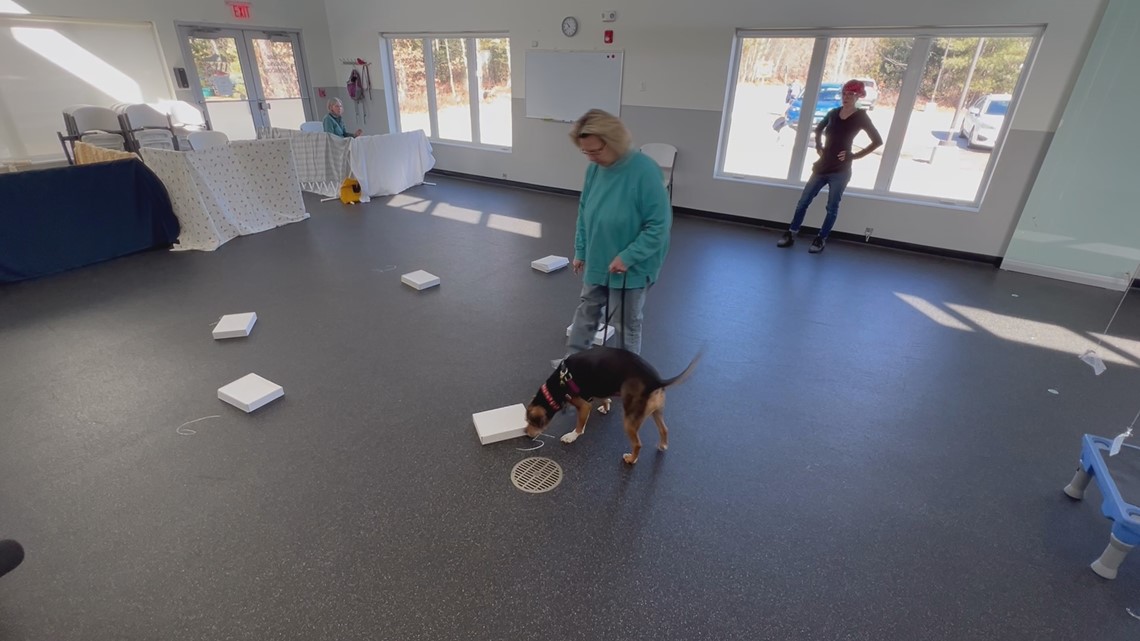Maine dogs are training to detect invasive species


Five dogs are taking part in a nationwide study organized by Texas Tech and Virginia Tech researchers to see if dogs have the ability to detect invasive species.
KENNEBUNK, Maine — Dogs can make for great companions as pets, but providing company isn't their only role. A new study is looking to take their natural abilities to the next step as one dog trainer at Kennebunk's Animal Welfare Society is training dogs to detect invasive species.
Five dogs—Tempe, June, Hopper, Woody and Cami—are taking part in a nationwide study organized by Texas Tech and Virginia Tech researchers to see if dogs have the ability to help combat the spread of invasive pests. The dogs, alongside their owners and AWS trainer Melissa McCrue-McGrath, train to detect the invasive spotted lanternfly.
“This is all proof of concept. Can we actually train these dogs to find invasive species?” McCrue-McGrath said.
McCue-McGrath is in charge of hiding dead insect eggs around the room in a box or hanging pouch for the dogs to sniff out. Once successful, the dogs must signal to their owners, whether it's by biting the box or sitting still in front of a pouch, to tell them they've identified the scent, and they'll be rewarded with a treat.
“We could start training pet dogs in dog training facilities just like this, pairing the thing that they love with the thing that we need them to find and then send them out into the woods,” she said.
She said the dogs were all scent trained using essential oils, like clove and cypress.
The spotted lanternfly was first detected in Pennsylvania in 2014, and it's infested 17 states since, according to the U.S. Department of Agriculture. The Maine Forest Service said it found its egg masses in 2020, but never found a live insect.
“If we can get them to trust their noses and tell us it's here, we can hopefully prevent this bug from getting into the state of Maine,” McCrue-McGrath said.
The dogs will complete an odor test at the end of March where they'll need to pass with an 80-percent to continue in the study. Out of six boxes, the dogs must detect a box with the spotted lanternfly scent. If they pass, the dogs and owners will train for a field test where they'll need to search the woods to find hidden eggs placed by McCue-McGrath and her team.
“What these dogs can do, they can smell 40 feet under your feet. That is four basketball nets straight into the earth,” she said. “Their sense of smell is so powerful, we can’t even begin to comprehend that.”
Don't miss these NEWS CENTER Maine stories
For the latest breaking news, weather, and traffic alerts, download the NEWS CENTER Maine mobile app.
Recent Posts
Deep Dives And Dogs: Trading old food for new kibbles | Currents Feature
click to enlarge (Jackson Nyx/Submitted) Jackson Nyx, owner…
Dog owners help their furry friends beat the heat
BALTIMORE — When it's this hot outside, a cup of cold water can go a…
Four adorable cats ‘desperately waiting’ for their new ‘purrfect’ home in Shropshire
Nigel, Remy, Waffle and Bagel are each patiently awaiting for a new home to call…
Cutest pet of the week: Olaf
RAPID CITY, S.D. (KOTA) - This is Olaf, a 6-year-old Welsh Corgi.His fun fact is…
PAWS Pet of the Week – Atlas; Volunteer Needs and Upcoming Events at PAWS Charles City – KCHA NEWS – Charles City’s News, Weather & Sports
COMMUNITY CONVERSATIONS BROUGHT TO YOU BY FLOYD COUNTY MEDICAL CENTER: In this week’s Community Conversation,…
They’re hot too: Keeping pets safe amid excessive heat
JACKSON, Tenn. — High temperatures have been common over the last few days and we…


